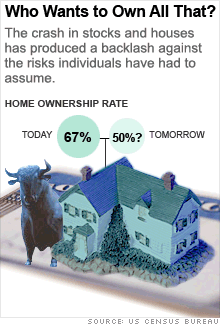The demise of the 'ownership society'
Americans are fleeing risk-taking of all kinds. Now's the time to embrace it.

(Money Magazine) -- Old: The 1980s ushered in a lasting change: the systematic transfer of risk from the government and employers down to individuals. Tax cuts on income and capital gains, for example, were meant to encourage you to invest more in stocks, buy homes, and start up businesses. These activities became the pillars of what George W. Bush would later dub the "ownership society."
But the ownership society also forced you to take on risks and responsibilities that had previously been spread around, including paying for health care and ensuring your own retirement security.
The 401(k), which sprang up in the early '80s, calls on workers to put up most (or all) of the money for their retirement and assume all the investment risk. These plans became so popular that Bush pushed a government version, the partial privatization of Social Security, in 2005. The plan didn't fly in the bull market earlier this decade. What's happened since surely won't help revive it.
New: In "The Audacity of Hope," Barack Obama criticized the ownership society because it "magnifies the uneven risks and rewards of today's winner-take-all economy." Now, with one in 10 mortgage borrowers delinquent or in foreclosure, and with many baby boomers having lost about a quarter of their nest eggs, support for the idea is waning. How far will the pendulum swing back?
Home ownership, now almost at 70%, will certainly fall, "and could drop to as low as 50% in the coming years," says economist Richard Florida. And after a loss in stocks, older investors will be tempted to lighten up on equities, especially as they transition out of the workforce. Also, look for the government to find ways to spread the burden of health care and retirement.
While the ownership society is under attack, you can make money by embracing it. How? By buying high-quality assets when others are fleeing them - and while prices are falling as a result. That's the hallmark of value investing.
For stocks, consider a blue-chip fund with a value bent, like Selected American Shares (SLASX). This Money 70 fund keeps more than a quarter of its assets in beaten-down financials, but its focus on firms with solid cash flow has led it to relatively strong banks like J.P. Morgan Chase (JPM, Fortune 500).
Real estate is another distressed sector that requires special expertise. Here, consider a fund like Third Avenue Real Estate Value (TAREX). In addition to owning stocks in the sector, this Money 70 fund also invests in some real estate bonds, offering an added degree of protection.
Another trait of value investing is to anticipate market moves. In an era of shared risks, tax rates, now at multi-decade lows, will surely climb, says IRA adviser Ed Slott. So save in a Roth IRA or Roth 401(k). In traditional IRAs and 401(k)s, you postpone taxes on your contributions until you withdraw at retirement. With Roths, you pay taxes now, not in the future when rates will likely be higher.
The downsizing of the U.S. consumer
The rise of freelance nation
The era of new regulation
The return of volatility ![]()


